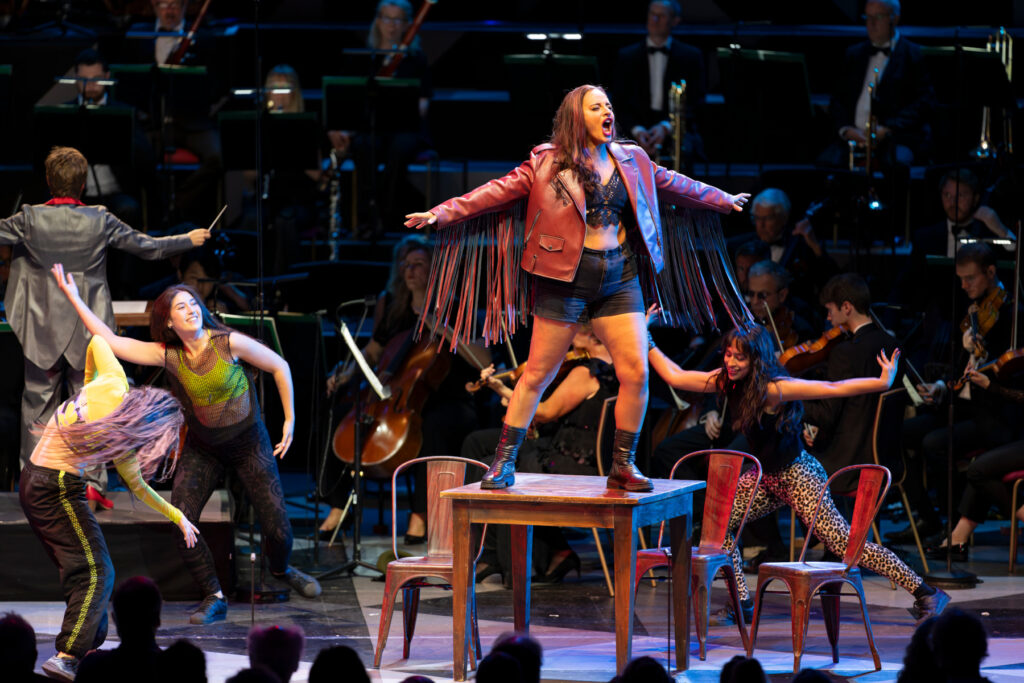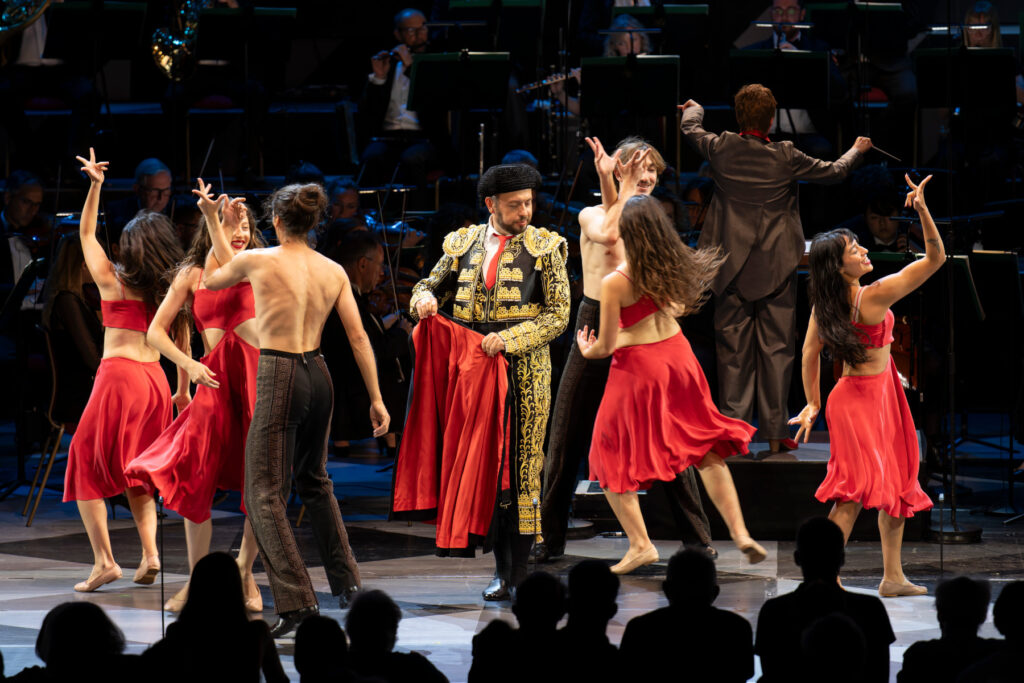There’s a long tradition of bringing productions from Glyndebourne to the BBC Proms in London. It’s one way of making them more widely accessible. The original production of Bizet’s Carmen with the award-winning Broadway director Diane Paulus in charge saw Robin Ticciati in the pit for the first run in May and June. For the performances in August, the shooting star from Bashkortostan, Aigul Akhmetshińa, took over the title role from the Tunisian-Canadian Rihab Chaieb, only to cede it to her for this concert performance. Anja Bihlmaier conducted the entire second run in Glyndebourne, so her appearance with the London Philharmonic Orchestra saw the fruits of that recent close collaboration.
Musically speaking, it was a sterling occasion: the playing of the LPO had a “lived in” feel to it. The Act 1 Prelude already had lava-like energy bubbling below the surface, married with a fine lyrical sweep. The slightly reduced string complement allowed a welcome transparency to the other textures and the opulent flute solo at the start of the Entr’acte to Act 3 was deliciously floated. In Act 4 the horns rang out commandingly, and as the opera neared its climax Bihlmaier conjured up some quite blood-curdling sounds from her orchestra. That is one of the benefits of a concert performance: every detail of this amazingly vibrant score tells in a way which doesn’t always happen in the opera-house.

The Glyndebourne Chorus sang their hearts out, not least in the crowd scenes of the final act, ably seconded by the children’s chorus, a bevy of hyperactive kids high on adrenaline.
As so often when a staging is relocated to the present-day, there were anachronisms and inconsistencies. For a supposedly dystopian society with grim signs of heightened masculine aggression and military violence, it is odd that the soldiers were only equipped with coshes, though later in the altercation between Zuniga and Don José knives were the weapons of choice. More particularly, one wonders about the antiquated local economy: these days cigarettes are turned out by highly efficient machines with no need for potentially rebellious cigarette girls. In Act 3 Don José takes a swig from a hip flask; in this environment I wouldn’t have been surprised to see him brandishing a can of Foster’s lager. Outside the bullring in Seville at the outset of Act 4 an ice-cream seller and purveyors of fruit juices plied their trade, with a handy supermarket shopping trolley packed full of oranges.
Not much was actually needed by way of stage furniture and props to create an appropriate atmosphere: a couple of tables and chairs for the opening act and later Lillas Pastia’s tavern; a few upturned crates with a simple cloth covering enabled the cards to be read in Act 3. Video projections were limited to scenic representation of a hilly terrain in smuggler territory.

One vital opportunity squandered was through use of the dance and dance-like movement in an opera which positively thrives on it. The seguidilla, which is crucial in Carmen’s strategy of enticing Don José to let her escape, went for nothing here. It should simmer with sensuous sexuality. At the tavern the women engaged in a lot of break dance routines, but elsewhere writhing hips were a poor substitute for classic moves. One highlight, however, was a ballet sequence at the start of Act 4, the four female and two male dancers appearing like something from Arabian Nights.
The costumes were disappointing. The folk in Seville were mostly clad in assorted beachwear, with a few sun-shades, making them seem like fugitives from Torremolinos. One thing which the Victorians knew well was that you don’t need acres of naked flesh to titillate and raise levels of desire. Carmen herself was for the most part skimpily dressed, a black bra at one point implying she was about to model ladies’ underwear. Escamillo managed with a simple charcoal outfit until the final act, when he emerged resplendent in traditional toreador attire. Here too, Don José exchanged his bland military fatigues for a grey lounge suit, stripping himself of his tie to use as the murder weapon. Micaëla was dressed as a first-aid responder with accompanying satchel, a red cross painted on her back which by her major Act 3 aria had curiously disappeared.
Vocally, there was very little to criticise. Carmen depends on a charismatic Carmen in total command of her role. Chaieb has the kind of warm and supple voice which is immediately beguiling, with no weakness as she moved through the registers, soaring effortlessly and at the lower end displaying a smoky richness with tobacco-infused chest tones. When she sang her “I defy everything” in Act 1, she sent out the unmistakeable message: don’t mess with me. This Carmen didn’t snarl or hiss but she did ooze endless spirit. Her richly varied characterisation included those moments of vulnerability, fragility even, when the cards fall badly for her in Act 3, and in the blackest depths of her mezzo range she felt Fate approaching fast. Above all, her superlative French diction added a ring of total authenticity.
I was also much taken with the Micaëla of Janai Brugger. Her fresh-toned soprano contrasted well with Carmen’s darker, more succulent voice, warm-hearted yet demure from the start, her concern “to do the right thing” for both Don José and his dying mother very credibly conveyed. She never over-emoted either, singing touchingly in her Act 3 duet with Don José of her sincere love for both.
Macho elements were well to the fore in Łukasz Goliński’s Escamillo. Initially, I found his timbral qualities somewhat cloudy and these together with a gravelly roughness in Act 3 made his character less immediately appealing, though his charms certainly worked on Carmen.
In Evan LeRoy Johnson’s assumption of Don José we had a man who looked the part, tall, imposing and confident. He scaled the highest regions of his tessitura with ease, graced his Act 2 Flower Song with a lovely legato line, the voice consistently pliant and full of ardour. His passion was late in coming though; I wish he’d been given stronger direction earlier in order to accentuate the degree of infatuation with his cigarette girl. His hot-headedness is part of who he is; he has already killed one man before the action starts, and his growing jealousy needed to emerge organically in his exchanges with Carmen.
All the minor roles were well taken, and again the idiomatic French contributed to the artistic success.
So what are we ultimately to make of this Carmen and this Carmen? Is she the classic femme fatale or herself a victim, caught up in a world she cannot entirely control? This is a riddle which will occupy generations to come; questions will continue to be asked to which few definite answers are possible. In its publicity material Glyndebourne calls Carmen “no ordinary opera”. It most certainly isn’t.
Alexander Hall
Carmen
Music by Georges Bizet
Opera in four acts with a libretto by Henri Meilhac and Ludovic Halévy, based on the novella by Prosper Mérimée.
Concert Performance by Glyndebourne Festival Opera with a semi-staging by Adam Torrance; sung in French with surtitles in English
Carmen – Rihab Chaieb; Don José – Evan LeRoy Johnson; Escamillo – Łukasz Goliński; Michaëla – Janai Brugger; Zuniga – Dingle Yandell; Moralès – Thomas Mole; Frasquita – Elisabeth Boudreault; Mercédès – Kezia Bienek; Le Dancaïre – Loïc Félix; Le Remendado – François Piolino; Lillas Pastia – Estéban Lecoq
The Glyndebourne Chorus – chorus-master Aidan Oliver; Singing Children drawn from Youth Opera and Trinity Boys Choir; London Philharmonic Orchestra; conductor – Anja Bihlmaier
Royal Albert Hall, London, 29 August 2024
All photos by Andy Paradise.